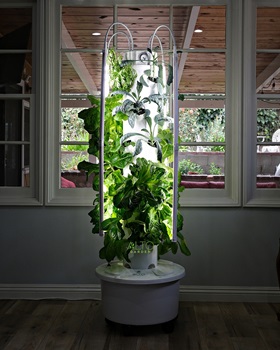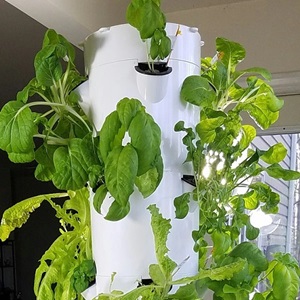Dec 5th 2024
Why Choose an Indoor Hydroponic Garden Tower for Your Home?
Hydroponic garden towers are growing in popularity as a way to raise plants using soil-less techniques. Why should you choose an indoor hydroponic garden tower? This blog post will discuss some of its benefits, so you fully understand what separates them from other types of growing methods.
Hydroponic Garden Tower Systems

A tower garden is a vertical hydroponics system that grows plants using a nutrient-rich water solution. Also known as an aeroponic tower - plant roots are suspended in air while an aqueous solution is intermittently pumped to provide them the nutrients they require. Although they are often installed indoors, hydroponic garden tower systems may also be set up outside in warm areas. Many crops, including strawberries, lettuce, Swiss chard, herbs, spinach, kale, broccoli, and blooming petunias, can be cultivated. These systems, which might cost $500 to $1,000 or more, are available online from a number of sources.
If lights are installed atop the tower, it may also be used to grow plants indoors, which is common in cities with little gardening space. The ALTO Garden GX Tower would be an excellent choice if you're searching for a high-quality hydroponic tower garden with lights .
The idea of vertical farming becomes a reality with hydroponic towers! Even if you don't have a typical garden, you may still cultivate a lot of plants thanks to these ingenious solutions. In addition to saving space, hydroponic towers provide any area a dash of contemporary, sculpture-like elegance. They supply nutrients straight to plant roots for faster development, using the same water-efficient principles as traditional hydroponic systems.
Are you prepared to learn more about this hydroponic indoor growing system? Let's get started!
How do Garden Towers Work?
An outline of how it operates is as follows: water and a nutrient blend are added to the reservoir tank, seedlings germinated in rockwool are placed in the net pots (instead of soil), and then nutrient-rich water is dripped over the plant roots.
Because these systems increase fertilizer and water exposure and provide minute control over environmental factors like temperature and pH balance, they are incredibly successful. The basic idea behind hydroponics is to provide plants precisely what they require at the right time. The fertilizer solutions used are customized to meet the requirements of the specific plant being cultivated. Indoor hydroponic garden towers also provide precise control over the amount of light and duration that the plants get. Additionally, pH levels may be tracked and modified. Plants develop more quickly in an environment that is highly regulated and tailored.

Outdoor plants face numerous factors that can have an adverse effect on their growth and well-being. Plant diseases can be transmitted by fungi in the soil. Ripe veggies can be stolen from your garden by animals like rabbits and squirrels. Crops can be completely destroyed in a single afternoon by pests like locusts. The unpredictable nature of outdoor plant cultivation is eliminated with hydroponic systems, since dangerous factors can be decreased by managing the plant's surroundings. Seedlings can reach adulthood considerably more quickly if the soil's mechanical barrier is removed. Indoor growing systems produce far healthier and superior fruits and vegetables by doing away with chemicals. Plants can develop more quickly and furiously when no barriers are in their way!
Pros of Garden Tower Systems
- Crop yields using hydroponic plant towers are very high because they have a steady supply of nutrients and water. Plants can develop more quickly and effectively.
- Water usage is lower with these systems than with conventional soil gardening. This is due to the water being continuously recycled, which prevents runoff and evaporation.
- Soilborne illnesses that can harm or kill plants do not affect indoor hydroponic garden towers. They are therefore a great option for plant growth in regions with polluted soil.
- Compared to other hydroponic systems, towers may take up to 80% less room. This can translate to 80% lower setup costs for interior spaces or greenhouses.
- An expert crew is necessary when it comes to commercial hydroponics. On the other hand, this indoor planting system may be set up and run by inexperienced people regardless of its scale.
- Tower gardens can be installed on a rooftop, in a greenhouse, outdoors, inside, or totally off the grid. Larger hydroponic systems with bigger footprints cannot provide such adaptability.
Advantages of Hydroponic Gardens
- Plants can grow in a regulated and watched-over environment with hydroponics. Furthermore, giving the roots the necessary nutrients directly promote quicker root growth.
- Because hydroponics eliminates the requirement for soil for plant growth, fewer cases of soil-borne illnesses occur. Furthermore, the likelihood of pest infestations is much reduced because this farming method is carried out indoors and everything is in a controlled environment.
- The fact that hydroponic farming conserves space is among its greatest benefits.
Final Thoughts
In conclusion, tower gardens offer a unique combination of benefits. Your gardening objectives, available resources, and personal tastes will play a major role if these indoor planting systems are right for you. Considerations include the types of plants you want to grow, the level of maintenance you’re comfortable with, and your budget.
A hybrid strategy can provide the best of both worlds for individuals deciding whether to grow with tower gardens or other hydroponic methods. The best hydroponic indoor garden for you may depend on how flexible it is. Ideally you’ll find a well-balanced gardening system that optimizes plant diversity and productivity, yet provides the high yields and efficiencies that come from tower gardens.




